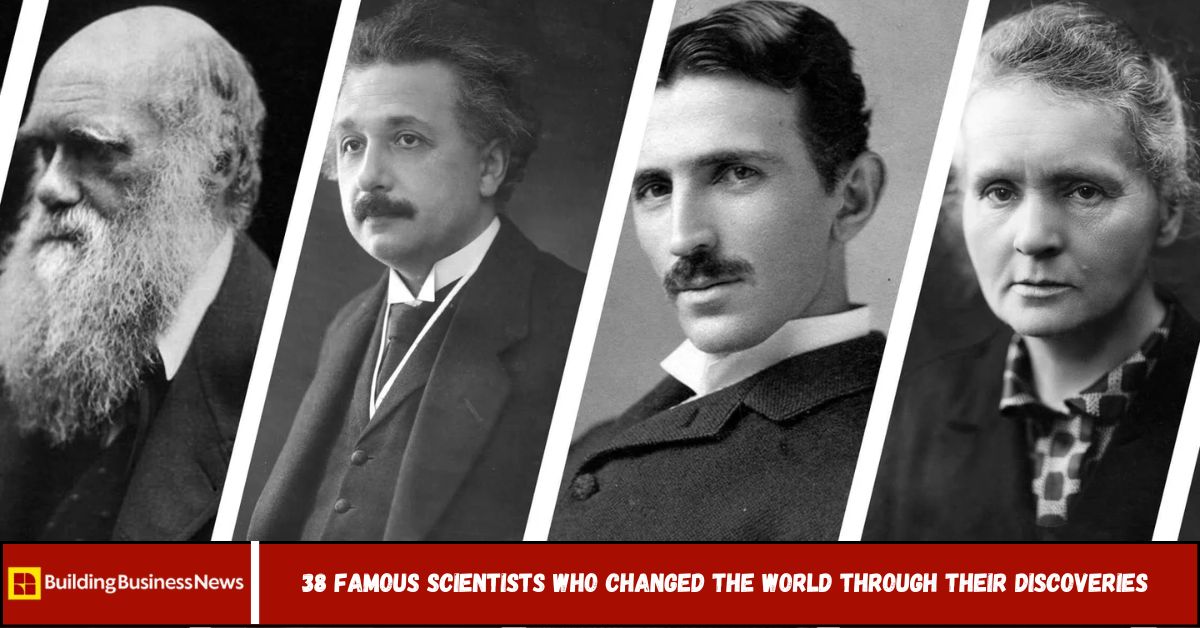Scientific discovery has always been central to human progress. From electricity to antibiotics, many of the systems and conveniences we rely on today were made possible by the work of pioneering scientists. But who were the individuals behind these breakthroughs?
In this article, you’ll find a concise overview of 38 influential scientists across disciplines such as physics, biology, chemistry, and medicine. We’ll look at their most significant discoveries and explain how those contributions continue to affect our daily lives.
Who are the scientists whose work changed the course of history? From Albert Einstein’s theories of relativity to Ada Lovelace’s early computer algorithms, these influential figures made discoveries that continue to shape modern science and technology.
Whether they explored the universe, advanced medical knowledge, or transformed how we understand life on Earth, their contributions span key fields like physics, biology, chemistry, and astronomy. Their work has improved daily life, fueled innovation, and expanded the boundaries of human understanding.
In this article, we highlight 38 famous scientists—past and present—whose breakthroughs left a lasting impact on the world. Discover who they were, what they achieved, and why their work still matters today.
Why These Scientists Matter
Understanding the people behind major discoveries helps us better appreciate how science solves real-world problems.
Key reasons these scientists are important:
- Their discoveries laid the foundation for technologies we use today.
- They solved real problems, from disease to energy.
- They inspired new research and future innovation.
38 Famous Scientists and Their Major Contributions
Let’s look at some of the most impactful scientists in history:
1. Isaac Newton (1643–1727)
- Field: Physics, Mathematics
- Known For: Laws of motion, universal gravitation
2. Albert Einstein (1879–1955)
- Field: Theoretical Physics
- Known For: Theory of relativity
3. Marie Curie (1867–1934)
- Field: Chemistry, Physics
- Known For: Discovery of radioactivity, radium, and polonium
4. Charles Darwin (1809–1882)
- Field: Biology
- Known For: Theory of evolution by natural selection
5. Galileo Galilei (1564–1642)
- Field: Astronomy, Physics
- Known For: Telescopic observations, support for heliocentrism
6. Nikola Tesla (1856–1943)
- Field: Electrical Engineering
- Known For: Alternating current (AC), wireless energy transfer
7. Rosalind Franklin (1920–1958)
- Field: Molecular Biology
- Known For: X-ray diffraction images of DNA
8. James Watson & Francis Crick
- Field: Genetics
- Known For: Discovery of DNA double helix structure
9. Stephen Hawking (1942–2018)
- Field: Theoretical Physics
- Known For: Black hole radiation, cosmology
10. Ada Lovelace (1815–1852)
- Field: Mathematics
- Known For: First computer algorithm
More Scientists Who Changed the World
Here’s a brief list of 28 more important figures and their contributions:
- Dmitri Mendeleev – Periodic table
- Louis Pasteur – Germ theory, vaccines
- Gregor Mendel – Principles of heredity
- Alexander Fleming – Discovered penicillin
- Carl Linnaeus – Classification of organisms
- Niels Bohr – Atomic model
- Michael Faraday – Electromagnetism
- Erwin Schrödinger – Quantum theory
- Richard Feynman – Quantum electrodynamics
- Barbara McClintock – Genetic elements
- Leonardo da Vinci – Anatomical studies
- Benjamin Franklin – Electricity
- Rachel Carson – Environmental science
- Jane Goodall – Primate behavior
- Tim Berners-Lee – World Wide Web
- Grace Hopper – Computer programming
- Alfred Wegener – Continental drift
- Hans Christian Ørsted – Electromagnetism
- André-Marie Ampère – Ampere’s law
- Emilie du Châtelet – Energy conservation
- Chien-Shiung Wu – Nuclear physics
- Hedy Lamarr – Wireless communication tech
- Linus Pauling – Chemical bonding, peace activism
- John Dalton – Atomic theory
- Jane Cooke Wright – Chemotherapy methods
- Subrahmanyan Chandrasekhar – Stellar evolution
- Jocelyn Bell Burnell – Discovered pulsars
- Tu Youyou – Malaria treatment (artemisinin)
Scientific Discovery in Today’s World: Quick Facts
- DNA sequencing is now used in over 100 countries for personalized medicine.
- Electricity access globally increased to 91% by 2023, driven by innovations in electrical systems.
- Over 5.3 billion people use the internet as of 2024—made possible by developments in computer science and physics.
These numbers show the long-term impact of scientific work across generations.
FAQs
1. Who is the most influential scientist in history?
Isaac Newton and Albert Einstein are often regarded as the most influential due to their foundational contributions to physics.
2. Which scientist discovered penicillin?
Alexander Fleming discovered penicillin in 1928.
3. What was Marie Curie’s biggest contribution?
She discovered radioactivity and isolated radium and polonium.
4. Who invented the internet?
Tim Berners-Lee developed the World Wide Web in 1989.
5. Are there still major scientific discoveries happening today?
Yes, especially in genetics, artificial intelligence, space, and medicine.
6. Why are these scientists important today?
Their work forms the basis of modern science, technology, medicine, and environmental policy.
Conclusion
The discoveries made by these 38 scientists didn’t just advance their fields—they transformed how we live, work, and understand the universe. Their work laid the groundwork for today’s innovations and continues to inspire the next generation of researchers and problem-solvers.

